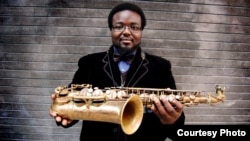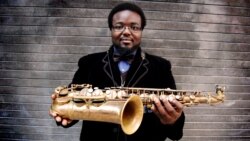The annual Thelonious Monk International Jazz Competition is one of the most prestigious jazz contests in the world. And as the name of suggests, the Monk Competition is decidedly international, with semi-finalists in the most recent contest coming not only from the United States, but also from countries including Austria and Australia, the Netherlands, Israel, and Chile.
One finalist in the competition, Godwin Louis, has had a jazz journey that has taken him from Haiti to New York.
Louis can remember the first time he heard jazz, all thanks to a relative in Connecticut.
"I was living in Haiti at the time and I have an uncle who’s a jazz guitarist, so he would send us some jazz CDs to check out,” he said.
He says he remembers listening in particular to a disc by alto saxophonist Cannonball Adderley and also to tenor saxophonist Sonny Rollins’ “Live at the Village Vanguard.” But it was the cassette tape Louis’s uncle sent down of saxophonist and bebop innovator Charlie Parker that really did it.
“That was sort of my introduction to jazz and improvisation,” he said.
The Parker recording that inspired Louis was of the saxophonist playing the song “White Christmas.”
“It was sort of like, Wow!, the liberties! It’s not quite the melody but it’s following some kind of shape that’s - it goes with the melody and it’s - it makes sense, but I just don’t know what it is," he said. "I want to be able to play like that.’”
Haiti might not be the first place you’d think of when you think of jazz. But today - and during the time Louis was growing up there, "jazz absolutely was popular,” he said.
And Louis continues to working to see it stays that way. He’s partnered with a number of Haiti’s best jazz players to demonstrate the country’s connection to jazz - a connection that goes back hundreds of years and is deeply rooted in Haitian and U.S. history. Both Haiti and the Louisiana territory that stretched from New Orleans up along the Mississippi River had been French colonies in the New World.
“A lot of Haitians migrated to the Louisiana Purchase, so with them they brought the culture, the architecture, cuisine, they brought their rhythms and everything else they could,” he said.
When he came to America to study jazz in 2009, Louis felt like he embodied this fusion. He’d been living in Haiti, and had grown up with Haitian rhythms that had long ago contributed to the creation of jazz. So it all seemed to fit. At the time, he says a teacher told him
“Man, some how you’re playing our music authentic, but it’s not the way we play it, but I can hear it - the authenticity and I think it came from that," he said.
Like in so many other places in the world, many Haitians immersed themselves in the culture of the United States, and on that score, Louis certainly went along.
“I also spent a lot of time of course, growing up in the [19]90s listening to popular music of the 90s," he said. "So I think all of it, when I play I guess I try to somehow - whether or consciously or subconsciously - find those influences and just play.”
Having been one of the finalists at the Monk Competition, says Louis, is “absolutely a dream come true. I get to add about 25 people on Facebook every day. I get more, you know, Twitter followers and so it’s pretty cool, it’s pretty cool,” he said.
And when he plays it, it’s also pretty hot.
One finalist in the competition, Godwin Louis, has had a jazz journey that has taken him from Haiti to New York.
Louis can remember the first time he heard jazz, all thanks to a relative in Connecticut.
"I was living in Haiti at the time and I have an uncle who’s a jazz guitarist, so he would send us some jazz CDs to check out,” he said.
He says he remembers listening in particular to a disc by alto saxophonist Cannonball Adderley and also to tenor saxophonist Sonny Rollins’ “Live at the Village Vanguard.” But it was the cassette tape Louis’s uncle sent down of saxophonist and bebop innovator Charlie Parker that really did it.
“That was sort of my introduction to jazz and improvisation,” he said.
The Parker recording that inspired Louis was of the saxophonist playing the song “White Christmas.”
“It was sort of like, Wow!, the liberties! It’s not quite the melody but it’s following some kind of shape that’s - it goes with the melody and it’s - it makes sense, but I just don’t know what it is," he said. "I want to be able to play like that.’”
Haiti might not be the first place you’d think of when you think of jazz. But today - and during the time Louis was growing up there, "jazz absolutely was popular,” he said.
And Louis continues to working to see it stays that way. He’s partnered with a number of Haiti’s best jazz players to demonstrate the country’s connection to jazz - a connection that goes back hundreds of years and is deeply rooted in Haitian and U.S. history. Both Haiti and the Louisiana territory that stretched from New Orleans up along the Mississippi River had been French colonies in the New World.
“A lot of Haitians migrated to the Louisiana Purchase, so with them they brought the culture, the architecture, cuisine, they brought their rhythms and everything else they could,” he said.
When he came to America to study jazz in 2009, Louis felt like he embodied this fusion. He’d been living in Haiti, and had grown up with Haitian rhythms that had long ago contributed to the creation of jazz. So it all seemed to fit. At the time, he says a teacher told him
“Man, some how you’re playing our music authentic, but it’s not the way we play it, but I can hear it - the authenticity and I think it came from that," he said.
Like in so many other places in the world, many Haitians immersed themselves in the culture of the United States, and on that score, Louis certainly went along.
“I also spent a lot of time of course, growing up in the [19]90s listening to popular music of the 90s," he said. "So I think all of it, when I play I guess I try to somehow - whether or consciously or subconsciously - find those influences and just play.”
Having been one of the finalists at the Monk Competition, says Louis, is “absolutely a dream come true. I get to add about 25 people on Facebook every day. I get more, you know, Twitter followers and so it’s pretty cool, it’s pretty cool,” he said.
And when he plays it, it’s also pretty hot.






